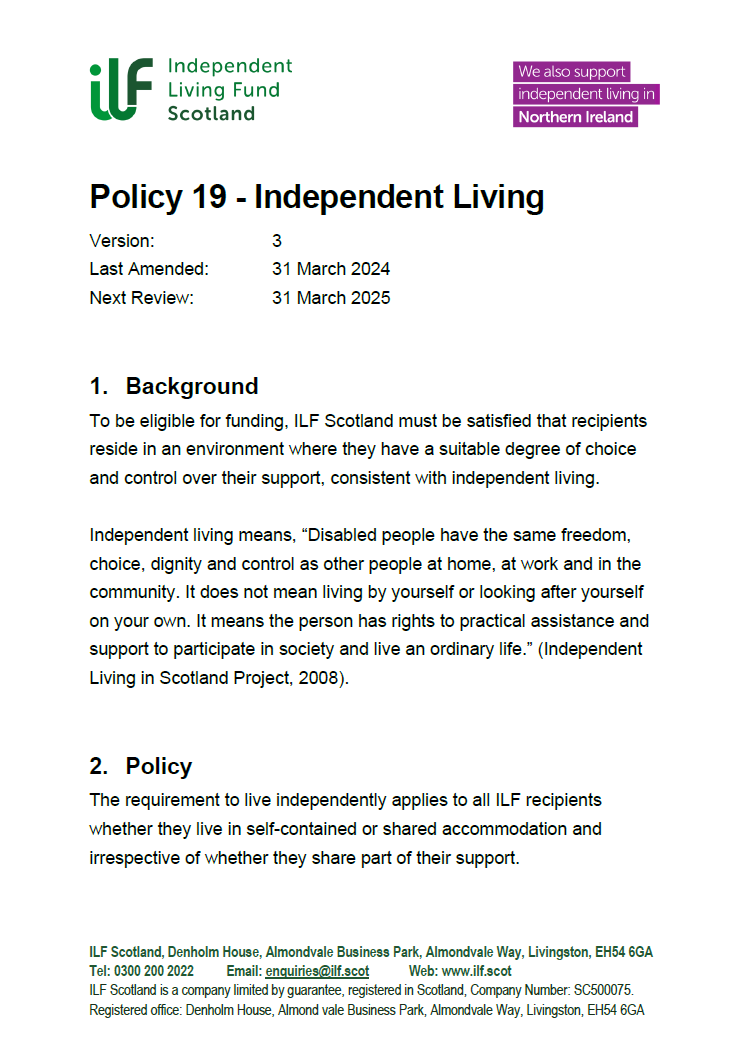
Version: 3
Last Amended: 31 March 2024
Next Review: 31 March 2025
To be eligible for funding, ILF Scotland must be satisfied that recipients reside in an environment where they have a suitable degree of choice and control over their support, consistent with independent living.
Independent living means, “Disabled people have the same freedom, choice, dignity and control as other people at home, at work and in the community. It does not mean living by yourself or looking after yourself on your own. It means the person has rights to practical assistance and support to participate in society and live an ordinary life.” (Independent Living in Scotland Project, 2008).
The requirement to live independently applies to all ILF recipients whether they live in self-contained or shared accommodation and irrespective of whether they share part of their support.
ILF Scotland can only make payments where the recipient has choice over where they live and control over what happens in their own home. To help establish whether a person is living independently with sufficient choice and control, the ILF Scotland fund recipient should have choice and control over:
ILF Scotland requires a full breakdown, including costs, of the care and support arrangements or individual support plan for each ILF Scotland recipient. To remain eligible for ILF Scotland funding, HSCPs / HSCT must meet the relevant ‘Threshold Sum’ (see Policy 24 - Statutory Input to ILF Scotland Funding) and ILF Scotland should be satisfied that all recipients receive a significant element of one to one support as part of their overall care package.
The principles of independent living still apply where there are two or more people sharing accommodation and sharing elements of care and support.
ILF Scotland needs to see more than a total budget for a group of people sharing care and support. It must be clear what support each individual needs, the level of support required, how much this costs, how many people are providing the support, which elements of support are shared with another person, and how many people are sharing that support.
If necessary, ILF Scotland will request a breakdown of the care and support provision and costs for other tenants (if they are not ILF Scotland recipients, they do not need to be identified by name) to understand how the care and support arrangements interlink.
Recipients sharing an element of support should have the same choice over their care provider as any other recipient. Any ILF Scotland funded support should only be for the individual recipient, in line with the agreed care plan. The recipient should notify ILF Scotland immediately of any changes.
Recipients must have a legal right to live in their own home confirmed by having their own tenancy agreement (where appropriate). Where a recipient’s landlord and care provider are the same person or organisation, or are closely linked, ILF Scotland will require a statement in writing from the landlord to confirm that the tenant is not obliged to receive support from that person or organisation.
No one living in a registered care establishment is eligible for ILF Scotland funding. Circumstances can arise where the recipient is not living in a registered care establishment but the arrangements in place suggest that the recipient is not living truly independently. ILF Scotland will consider the specific circumstances of each recipient in line with the indicators set out in section 3 above.
This is a decision for the Care Inspectorate (Scotland) or the Regulation and Quality Improvement Authority (Northern Ireland), and ILF Scotland would normally accept their decision. However, if an ILF Scotland Assessor has reason to believe that an establishment should be registered, they will raise this with the HSCP / HSCT. They will refer serious concerns to the ILF Scotland senior management team and potentially to the appropriate regulator.
Adult Placement is separate from residential care home registration and exists to enable disabled people to live within the community in a family environment. It is important that all ILF Scotland funding supports independent living with choice and control. In general, we expect that Adult Placements will provide a satisfactory degree of choice and control. ILF Scotland will normally accept the judgement of the HSCP / HSCT as to the suitability of the Adult Placement. It will need to be satisfied though that the placement follows ILF Scotland independent living policy principles and that the recipient has adequate choice and control over their arrangements. Where there are concerns about the suitability of an arrangement, ILF Scotland will raise this with the HSCP / HSCT.
We recognise that it may not be straightforward for a disabled person in an Adult Placement to choose to employ his or her own Personal Assistant, but that their specific arrangement should not exclude this. ILF Scotland will seek assurance that the recipient has choice and control over all other aspects of their life in line with the indicators set out in section 3 above.
01 July 2015
31 March 2023
31 March 2024